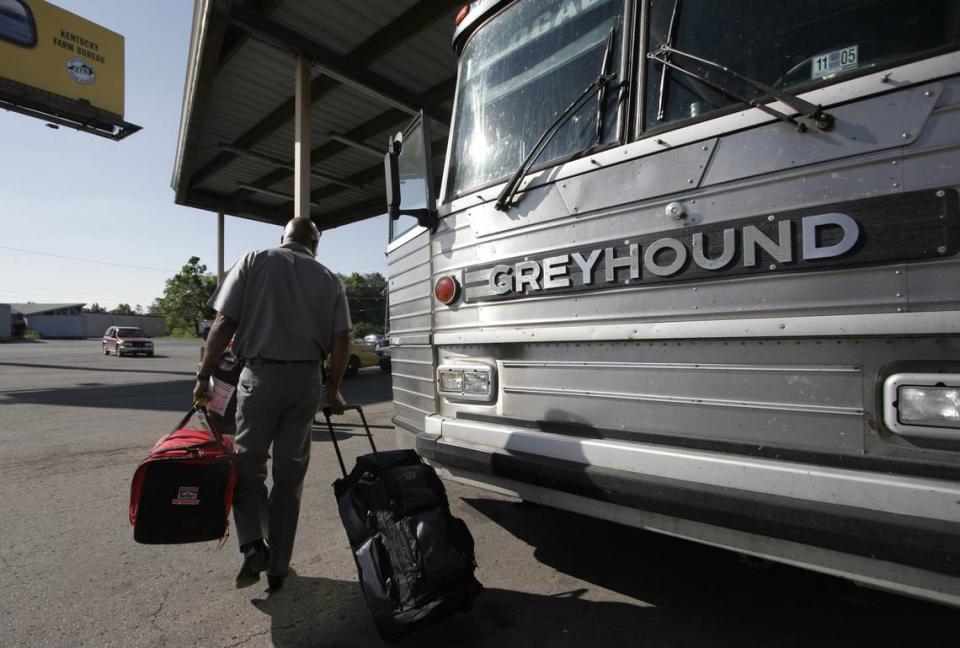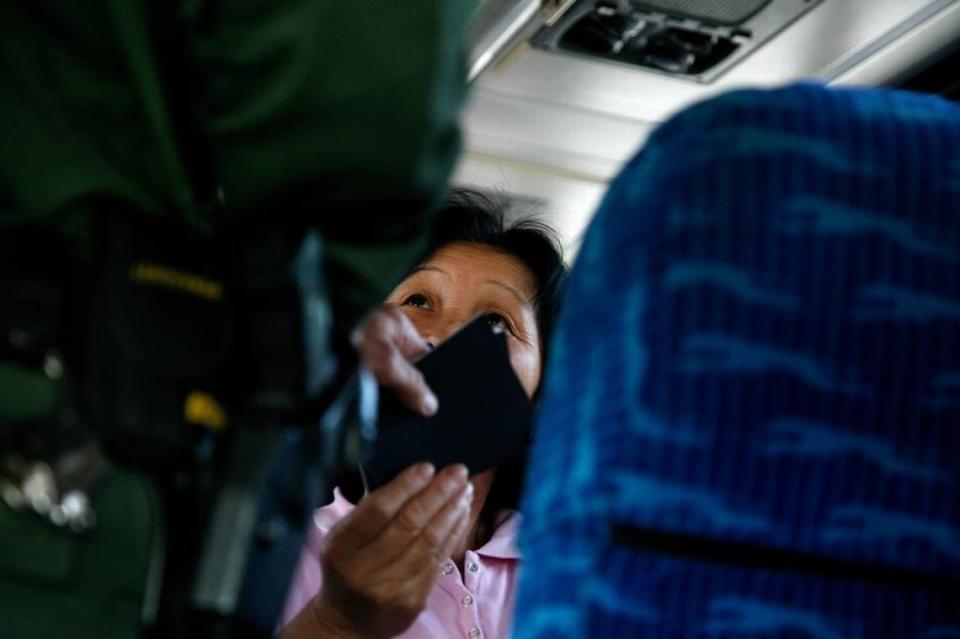Greyhound riders are being asked for immigration papers at South Florida bus terminals
Federal immigration agents are beefing up their efforts to apprehend undocumented immigrants in South Florida as part of a nationwide effort to “keep communities safe.”
The target: transportation hubs.
In the past few weeks, Customs and Border Patrol officials have been spotted by commuters at Greyhound bus stations across Miami-Dade and Broward counties, asking riders on board, or in the process of boarding a bus, for proof of legal status.
The U.S. Border Patrol confirmed the sightings in an email to the Miami Herald:
“U.S. Border Patrol has been performing enforcement actions away from the immediate border in direct support of border enforcement efforts and as a means of preventing trafficking, smuggling and other criminal organizations from exploiting our public and private transportation infrastructure to travel to the interior of the United States. ... Agents in Florida enforce immigration law while working closely with local, state and federal law enforcement partners to keep communities safe while securing the coastal borders.”
The presence of immigration officials conducting “transportation checks” at transit hot spots isn’t necessarily new. However, CBP’s enforcement operations — as well as missions by U.S. Immigration and Customs Enforcement — have been exponentially ramped up by the Trump administration as part of the president’s vision to “fix” the country’s “broken immigration system.”
“People know that people can’t fly because of their illegal status. So what do they do? They take trains or Greyhound buses. This is known, especially to ICE and CBP,” said Tammy Fox-Isicoff, a prominent South Florida immigration attorney who sits on the board of the American Immigration Lawyers Association.
Fox-Isicoff said one of her clients, a Filipino foreign national, was apprehended three weeks ago at a Greyhound bus stop in Miami. She was in town from Las Vegas for a high school reunion.
“My client was asked for identification and proof of legal status while on the bus before the bus route started. When she didn’t produce them, she was apprehended. She’s now in ICE custody at the Broward Transitional Center.”
CBP agents, according to federal law, don’t need a warrant to “within a reasonable distance from any external boundary of the United States ... board and search for aliens in any vessel within the territorial waters of the United States and any railcar, aircraft, conveyance, or vehicle.”
The law defines a “reasonable distance” as 100 air miles from the coastal border — which covers the entire state of Florida.
“While most Border Patrol work is conducted in the immediate border area, agents have broad law enforcement authority and are not limited to a specific geography within the United States,” CBP said in a statement. “They have the authority to question individuals, make arrests, and take and consider evidence.”
When CBP encounters someone without proof of legal status — such as a green card or visa paperwork, as required by federal law — the person is immediately detained and temporarily held in CBP custody before being transferred to U.S. Immigration and Customs Enforcement and Enforcement Removal Operations.
“If I were a tourist, I would stay the hell out of the United States, especially Florida,” Fox-Isicoff said. “I mean, who takes a passport to the beach? And forget tourists. Who walks around with their documents? Nobody. But unfortunately, you have to.”

The Immigration and Nationality Act requires every “alien” 18 years of age and over to “carry with him and have in his personal possession” his or her “evidence of registration document” (such as Form I-94 or green card) “at all times,” including when traveling domestically or just going about daily.
“Any alien who fails to comply with the provisions of this subsection shall be guilty of a misdemeanor and shall upon conviction for each offense be fined not to exceed $100 or be imprisoned not more than thirty days, or both,” according to U.S. Code.
Visa holders are also required to carry documentation. If a person has applied to extend their stay, or change their status, if the request is still pending in the courts and yet to be reviewed, and the person carries proof of that request, technically, the person is not of legal status and can still be apprehended, Fox-Isicoff said.
“The bigger problem here is that it’s taking now almost a year to process those requests. So even if you did your due diligence, filed your request in the courts, and carry your receipt of paying the required request fee, it still doesn’t count as proof,” Fox-Isicoff said. “Times have changed. The government is trying to stop even legal immigration.”
Greyhound told the Miami Herald that “CBP searches have negatively impacted both our customers and our operations.”
“Greyhound does not coordinate with CBP in regards to these checks, nor do we support these actions. We are calling on Congress to change the law and will support positive efforts to do so,” the company said. “As a regulated carrier, Greyhound is required to comply with the requests of federal agents; however, we understand the importance of our customers being informed about potential checks. Because of this, we provide bilingual Know Your Rights information in our terminals and online as well. “
The American Civil Liberties Union disputes that Greyhound is required to comply. Two weeks ago, ACLU attorneys across the country sent a scathing letter to FirstGroup, Greyhound’s parent company, saying “multiple incidents across the US have resulted in the harassment and racial profiling of people of color and families — regardless of immigration status — as well as the detention and deportation of Greyhound customers.”
“As a private business, Greyhound has a Constitutional Fourth Amendment right to deny CBP permission to board and search its buses without probable cause or a warrant, assuming they are on domestic routes and do not cross formal checkpoints,” the letter said. “However, Greyhound has refused to exercise this right or communicate to the Department of Homeland Security, which oversees the CBP, that it will not consent to agents illegally boarding its buses.”

The ACLU said a 2018 U.S. Supreme Court ruling, in the case of Collins v. Virginia, means Customs must have probable cause to enter a bus.
In that case, the high court concluded that “Automobile or no automobile, there must be probable cause for the search. ... In enforcing the Fourth Amendment’s prohibition against unreasonable searches and seizures, the Court has insisted upon probable cause as a minimum requirement for a reasonable search” permitted by the Constitution.
“Therefore,” the ACLU wrote, “CBP must have probable cause to board and search for immigration infractions. This behavior is unacceptable, and it is within the power of FirstGroup Plc to change it.“
Greyhound would not comment on the ACLU’s position.
Over the past three months, many county law enforcement agencies in Florida have signed off on a plan for ICE to train and deputize officers, giving them the ability to arrest and detain undocumented immigrants. Though neither Miami-Dade County police nor any municipal police department in the county has yet to take part, lawyers and advocates believe it’s one of the administration’s avenues to “repeatedly attack immigrants.”
“There is an escalating humanitarian crisis in the United States around the treatment of immigrants and refugees,” the ACLU said.
Meanwhile, attorneys say it’s only a matter of time before U.S. citizens are detained more frequently in the process.
“It’s already happened in other states,” Fox-Isicoff said. “Immigration is not black and white, it’s shades of gray, and if you look different, have an accent, chances are you will be targeted next.”

